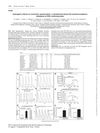 September 2021 in “European Neuropsychopharmacology”
September 2021 in “European Neuropsychopharmacology” The research explores how gut bacteria and sleep patterns are related in mental health disorders.
 July 2021 in “European Journal of Plastic Surgery”
July 2021 in “European Journal of Plastic Surgery” Modern society values both traditional beauty and imperfections, but media pressures lead to more cosmetic enhancements and ethical concerns.
 April 2021 in “European medical journal”
April 2021 in “European medical journal” A COVID-19 patient had severe and long-lasting skin issues and unusual hair loss.
 April 2021 in “European journal of medical and health sciences”
April 2021 in “European journal of medical and health sciences” The pandemic stress may have increased alopecia cases in Bangladesh.
March 2020 in “European Journal of Pediatric Dermatology” Isotretinoin can cause gynecomastia by lowering testosterone levels.
November 2019 in “European journal of internal medicine” A Laotian man with unusual skin changes and multiple growths in his gut was diagnosed with Cronkhite-Canada Syndrome and improved with nutritional and immune-based treatments.
 October 2019 in “European heart journal”
October 2019 in “European heart journal” Androgen-deprivation therapies increase the risk of certain heart conditions, but testosterone treatment may help.
 March 2019 in “European Urology Supplements”
March 2019 in “European Urology Supplements” Some common medications like metformin, insulin, and ACE inhibitors can lower PSA levels, while statins don't, and low dose finasteride significantly reduces PSA.
December 2018 in “European Journal of Pediatric Dermatology/PD. European journal of pediatric dermatology” Segmental vitiligo affects hair follicle melanocytes, causing small, uniform depigmented spots.
 May 2018 in “European Journal of Dermatology”
May 2018 in “European Journal of Dermatology” The first Japanese family with Marie Unna hereditary hypotrichosis showed hair condition improvement in a child and highlighted the risk of misdiagnosis.
 May 2018 in “European Journal of Dermatology”
May 2018 in “European Journal of Dermatology” Adjusting the medication tacrolimus resolved a boy's red nail beds after a stem cell transplant.
January 2017 in “European Journal of Dermatology” Excessive facial hair growth can indicate an underlying cancer.
December 2015 in “European Journal of Pediatric Dermatology” Newborns can experience temporary hair loss in bands, unrelated to sleeping position.
 November 2015 in “European Journal of Inflammation”
November 2015 in “European Journal of Inflammation” Cicatricial alopecia, a permanent hair loss condition, is mainly caused by damage to specific hair follicle stem cells and abnormal immune responses, with gene regulator PPAR-y and lipid metabolism disorders playing significant roles.
 November 2015 in “European journal of dermatology/EJD. European journal of dermatology”
November 2015 in “European journal of dermatology/EJD. European journal of dermatology” A 55-year-old woman with several health conditions did not see hair regrowth after a transplant.
May 2015 in “European Journal of Paediatric Neurology” ECCL should be considered in patients with specific skin and eye lesions.
July 2014 in “European Journal of Cancer” p14ARF and p16Ink4a cause hair follicle stem cell aging and dysfunction.
 January 2014 in “European Geriatric Medicine”
January 2014 in “European Geriatric Medicine” A postmenopausal woman's virilization was caused by a rare ovarian tumor that was hard to detect but was successfully treated with surgery.
January 2014 in “European Journal of Dermatology” A method was found to visualize hair regrowth and avoid unnecessary side effects from treatments.
 October 2013 in “European Orthopaedics and Traumatology”
October 2013 in “European Orthopaedics and Traumatology” A woman's hair grew back within 3 months after temporary hair loss from improper head positioning during shoulder surgery.
 October 2012 in “European Neuropsychopharmacology”
October 2012 in “European Neuropsychopharmacology” People with early psychosis eat more calories, saturated fat, and sugar, and the drug olanzapine may lead to eating even more calories.
 July 2012 in “European journal of cancer”
July 2012 in “European journal of cancer” MPA increases cancer spread by boosting Eph A2 activity.
September 2011 in “European journal of cancer”  March 2011 in “European Urology Supplements”
March 2011 in “European Urology Supplements” Blood tests for tumor cells could improve prostate cancer diagnosis and treatment; hair loss severity linked to a gene affecting prostate conditions.
 March 2011 in “European Urology Supplements”
March 2011 in “European Urology Supplements” The document concludes that a new biosensor can efficiently detect prostate cancer cells and that standardized referrals help find significant cancers effectively.
 March 2011 in “European Urology Supplements”
March 2011 in “European Urology Supplements” CEC levels may be a useful marker for predicting prostate cancer progression.
 September 2010 in “European Urology Supplements”
September 2010 in “European Urology Supplements” PSA testing is a reliable method for detecting prostate cancer, and opioids may lower PSA levels, but triglycerides don't affect prostate cancer risk.
 September 2010 in “European Urology Supplements”
September 2010 in “European Urology Supplements” Higher urethral PSA levels after prostate removal surgery may be linked to more hair loss and higher PSA levels post-surgery.
 September 2010 in “European Urology Supplements”
September 2010 in “European Urology Supplements” Opioid use may lower PSA levels, suggesting a possible role in prostate cancer control; PSA testing is useful for detecting prostate cancer; serum triglycerides are not linked to prostate cancer risk; and higher urethral PSA levels may be associated with local hormone activity.
 September 2010 in “European Urology Supplements”
September 2010 in “European Urology Supplements” The document does not confirm if radical prostatectomy is the best treatment for locally advanced prostate cancer.





















